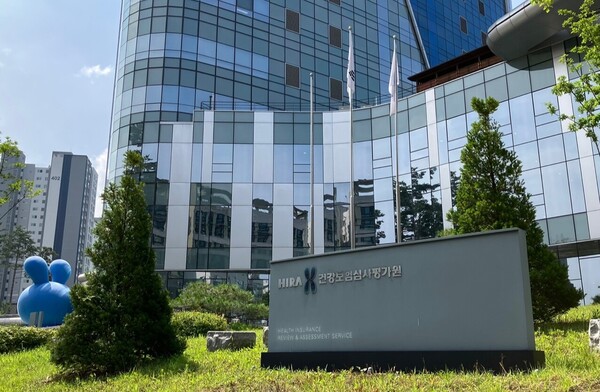Vyndamax (tafamidis), a drug to treat the rare disease transthyretin amyloid cardiomyopathy (ATTR-CM), and Qarziba (dinutuximab beta), a drug to treat neuroblastoma, have finished 80 percent of the reimbursement process.
Darzalex (daratumumab) for multiple myeloma has been recognized as appropriate for reimbursement by the Pharmaceutical Reimbursement Evaluation Committee (PREC) following a review of its request for expanding benefits for the DVTd (daratumumab/bortezomib/thalidomide/dexamethasone) four-drug regimen in first-diagnosed patients.

On Thursday, the Health Insurance Review and Assessment Service (HIRA) held the 10th PREC meeting for this year and released its results.
Vyndamax was recognized as appropriate for benefits four years after it was approved by the Ministry of Food and Drug Safety (MFDS) in August 2020 for treating adult patients with wild-type or hereditary ATTR-CM.
It was Pfizer’s fourth reimbursement challenge for its orphan drug.
Pfizer launched its first reimbursement challenge upon the initial approval by seeking designation as an essential drug, but it failed. The company made a second reimbursement challenge in the first half of 2021 through a Risk Sharing Agreement (RSA) formula, which was also unsuccessful.
In 2022, the company seemed to make progress in its third reimbursement challenge, succeeding in establishing a reimbursement standard. However, it failed to convince the government in the subsequent subcommittee meetings to review economic value and risk-sharing and received a “non-reimbursement” decision in April last year.
In the meantime, Vyndamax's diagnosis and treatment environments have gradually improved, as its indication, ATTR-CM was newly designated as a “rare disease subject to national management,” and patients became eligible for special calculation benefits.
If Vyndamax successfully completes drug price negotiations with the National Health Insurance Service (NHIS) 60 days after starting the negotiations and enters the reimbursement sphere, ATTR-CM patients in Korea will be able to administer Vyndamax at a 10 percent co-payment rate.
Qarziba, the first drug subject to the parallel approval-evaluation-negotiation pilot process but received a “non-reimbursement” decision at the eighth PREC meeting, also crossed the threshold after redeliberation following an appeal.
Qarziba, approved by the MFDS in June for treating pediatric neuroblastoma patients aged 12 months or older -- who are high-risk, relapsed, or refractory, who have previously received myeloablative therapy and stem cell transplantation after a partial response or worse after induction chemotherapy -- passed the PREC threshold within three months of approval, significantly shortening the review period as intended by the system.
Besides, the PREC recognized the reimbursement appropriateness of the four drugs with the apremilast ingredient -- Otelia, Apsola, Otebell, and Otemila -- which were on the agenda for new reimbursement. However, it was contingent on the drugmaker accepting a price below the government's assessment.
Apremilast, originally developed by Amgen as Otezla, treats moderate-to-severe plaque psoriasis and active psoriatic arthritis. Otezla, which attracted attention as an oral psoriasis drug, was introduced in Korea by Amgen 2017 but failed to enter the reimbursement sphere. In 2022, Amgen voluntarily withdrew Otezla's license. Since then, as Otezla's substance patent has expired, generics have been launched by Dong-A ST, Daewoong Pharmaceutical, Chong Kun Dang, and Dongkoo Biopharm. The PREC has conditionally recognized the appropriateness of these drugs.
Darzalex, which was not approved for reimbursement at the fifth PREC meeting, passed it after redeliberation. The approved indication is DVTd four-drug therapy, approved in August 2019. This is the first green light to expand the reimbursement after more than five years of domestic approval.
Darzalex, first approved by the MFDS in November 2017 as a monotherapy for treating relapsed or refractory multiple myeloma, has since expanded its indications to include DVMP, DVTd, DRd, DVd, and DKd. However, the reimbursement has not been expanded beyond the initially approved fourth-line monotherapy.
After the latest PREC meeting, the results of the appeals of drugs reevaluated for reimbursement at its seventh meeting were also announced.
At that time, the committee deliberated on reappraising the appropriateness of the reimbursement of the original drugs this year and recognized the appropriateness of three of the seven drugs. The three approved ones are thioctic acid, pranlucast hydrate, and mosapride, while the unapproved four are itopride hydrochloride, sarpogrelate hydrochloride, levodropropizine, and formoterol fumarate hydrate.
The four products not recognized for appropriateness at the time made appeals, and the reconsideration results were announced this time.
Upon review, itopride hydrochloride was not recognized as appropriate for reimbursement, and its removal was confirmed. Sarpogrelate hydrochloride and levodropropizine were also found to be “not appropriately priced.” Still, the committee added that they could be “appropriately priced if cost-effectiveness is met.”
Formoterol fumarate hydrate was concluded to be “inappropriate,” but the review was conditionally deferred pending the submission of a clinical re-evaluation report by the MFDS.
Related articles
- Pfizer Korea’s Prevenar 20 becomes pneumococcal vaccine with the broadest serotype coverage in Korea
- Reimbursement OKed for Lilly's Jaypirca, coverage for Janssen's Zytiga, Pfizer's Lorviqua expanded
- Pfizer and Korea Vaccine Sales to co-promote Prevenar 20
- 'With Vyndamax reimbursed, Korea moves toward better ATTR-CM management'

